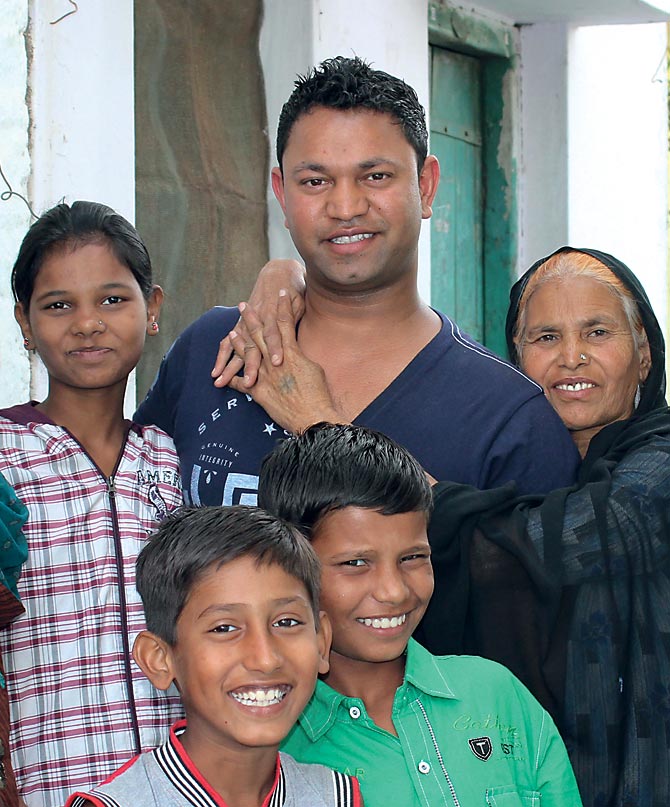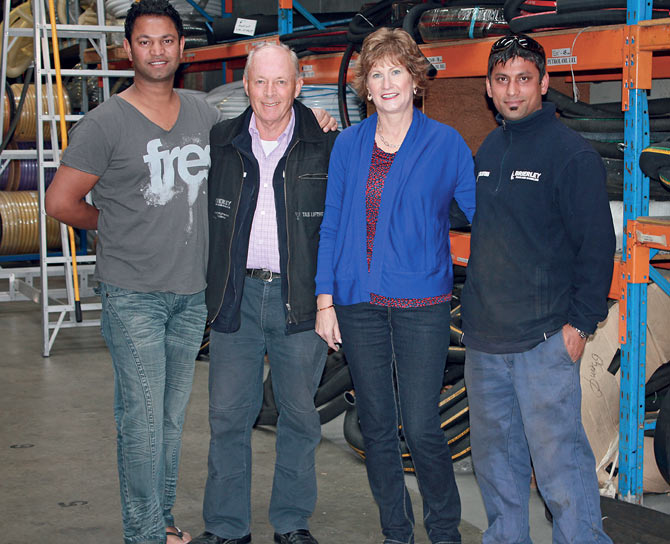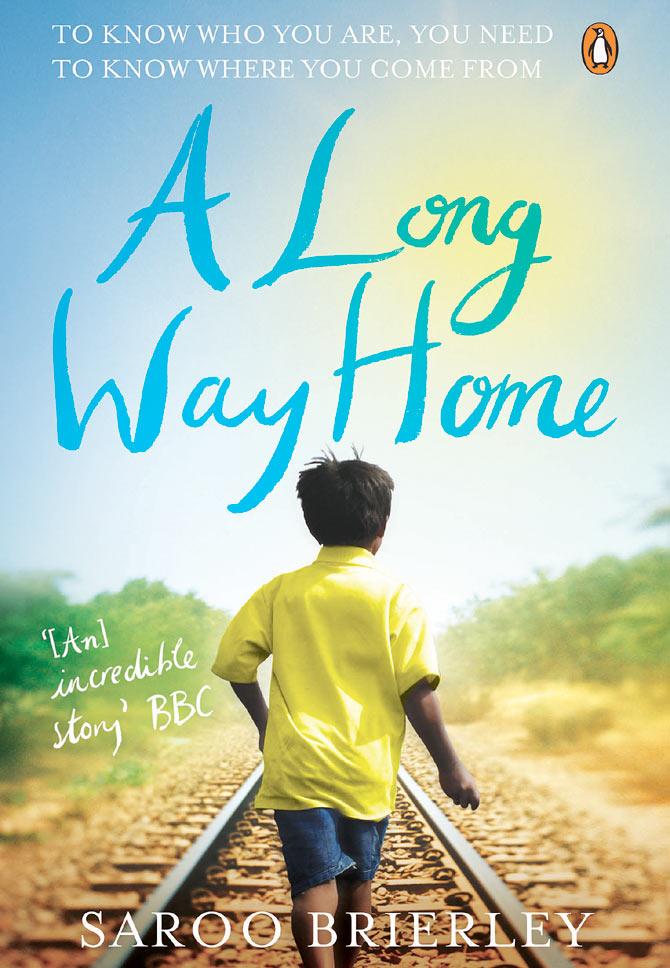
Saroo Brierley was separated from his parents when he was five. After being adopted by an Australian couple and being raised in Tasmania, Brierley returned to India in the hope of finding his mother. Excerpts from his fascinating true account, A Long Way Home:
When he was five, Saroo Brierley and his elder brother would sweep trains to help support their mother. One day the exhausted little boy fell asleep in one of the trains only to wake up in Kolkata surrounded by thousands of unknown faces.
With almost no recollection of where he came from or the name of the town, Saroo became a statistic in the city -- just one of the countless children who had nowhere to go back to.
Eventually, Saroo was adopted by an Australian couple -- Sue and John Brierley -- and was raised in Hobart, Tasmania, Australia.
25 years later, Saroo Brierley decided to retrace his steps and returned to India. This fascinating, almost unbelievable journey has been documented in A Long Way Home.
An exclusive excerpt from the book:
When I was growing up in Hobart, I had a map of India on my bedroom wall. My mother -- my adoptive mother, Mum -- had put it there to help me feel at home when I arrived from that country at the age of six to live with them, in 1987.
She had to teach me what the map represented -- I was completely uneducated and don't think I even knew what a map was, let alone the shape of India.
Mum had decorated the house with Indian objects -- there were some Hindu statues, brass ornaments and bells, and lots of little elephant figurines. I didn't know then that these weren't normal objects to have in an Australian house.
She had also put some Indian printed fabric in my room, across the dresser and a carved wooden puppet in a brightly coloured outfit. All a long way home these things were sort of familiar, even if I hadn't seen anything exactly like them before.
Another adoptive parent might have made the decision that I was young enough to start my life in Australia with a clean slate and could be brought up without much reference to where I'd come from. But my skin colour would always have given away my origins, and anyway, she and my father chose to adopt a child from India for a reason.
The map's hundreds of place names swam before me in my childhood. Long before I could read them, I knew that the immense V of the Indian subcontinent was a place teeming with cities and towns, with deserts and mountains, rivers and forests -- the Ganges, the Himalayas, tigers, gods -- and it came to fascinate me. I would stare up at the map, lost in the thought that somewhere among all those names was the place I had come from, the place of my birth. I knew it was called 'Ginestlay', but whether that was the name of a city, or a town, or a village, or maybe even a street - and where to start looking for it on that map -- I had no idea.
I didn't know for certain how old I was, either. Although official documents showed my birthday as 22 May 1981, the year had been estimated by Indian authorities and the date was the day I had arrived at the orphanage from which I had been offered up for adoption. An uneducated, confused boy, I hadn't been able to explain much about who I was or where I'd come from.
At first, Mum and Dad didn't know how I'd become lost. All they knew -- all anyone knew -- was that I'd been picked off the streets of Calcutta, as it was still known then, and after attempts to find my family had failed I had been put in the orphanage.
Happily for all of us, I was adopted by the Brierleys. So to start with, Mum and Dad would point to Calcutta on my map and tell me that's where I came from - but in fact the first time I ever heard the name of that city was when they said it.
It wasn't until about a year after I arrived, once I'd made some headway with English, that I was able to explain I didn't come from Calcutta at all -- a train had taken me there from a train station near 'Ginestlay', which might have been called something like 'Bramapour', 'Berampur' . . . I wasn't sure. All I knew was that it was a long way from Calcutta and no-one had been able to help me find it.
Excerpted from A Long Way Home by Saroo Brierley with kind permission of Penguin Books India (Rs 399). Purchase a copy of the book here.
Please click NEXT to continue reading Saroo Brierley's story...

Of course, when I first arrived, the emphasis was on the future, not the past. I was being introduced to a new life in a very different world from the one I'd been born into, and my new mum and dad were putting a lot of effort into facing the challenges that brought. Mum didn't worry too much about my learning English immediately as she knew it would come through day-to-day use.
Rather than trying to rush me into it, she thought it was far more important at the outset to comfort and care for me, and gain my trust. You don't need words for that.
She also knew an Indian couple in the neighbourhood, Saleen and Jacob, and we would visit them regularly to eat Indian food together. They would speak with me in my own language, Hindi, asking simple questions and translating instructions and things Mum and Dad wanted me to know about how we'd live our life together.
Coming from a very basic background, I didn't speak much Hindi either, but being understood by someone was a huge help in becoming comfortable about my new surrounds.
Anything my new parents weren't able to communicate through gestures and smiles we knew Saleen and Jacob could help us with, so we never got stuck.
As children do, I picked up my new language quite quickly. But at first I spoke very little about my past in India. My parents didn't want to push me to talk about it until I was ready, and apparently I didn't show many signs that I gave it much thought.
Mum remembers a time when I was seven, when out of the blue I got very distressed and cried out, 'Me begot!' Later, she found out I was upset that I had forgotten the way to the school near my Indian home, where I used to walk to watch the students. We agreed then that it probably didn't matter anymore.
But deep down, it did matter to me. My memories were all I had of my past, and privately I thought about them over and over, trying to ensure I didn't 'beget'. In fact, the past was never far from my mind.
At night, memories would flash by and I'd have trouble calming myself so I could sleep. Daytime was generally better, with lots of activity to distract me, but my mind was always busy.
As a consequence of this and my determination not to forget, I have always recalled my childhood experiences in India clearly, as an almost complete picture -- my family, my home and the traumatic events surrounding my separation from them have remained fresh in my mind, sometimes in great detail. Some of these memories were good, and some of them bad -- but I couldn't have one without the other, and I couldn't let them go.
My transition to life in another country and culture wasn't as difficult as one might expect, most likely because, compared to what I'd gone through in India, it was so obvious that I was better off in Australia. Of course, more than anything I wanted to find my mother again, but once I'd realised that was impossible
I knew I had to take whatever opportunity came my way to survive. Mum and Dad were very affectionate, right from the start, always giving me lots of cuddles and making me feel safe, secure, loved and, above all, wanted. That meant a lot to a child who'd been lost and had experienced what it was like when no one cared about him.
I bonded with them readily and very soon trusted them completely. Even at the age of six (I would always accept 1981 as the year of my birth), I understood that I had been awarded a rare second chance. I quickly became Saroo Brierley.
Now I was safe and secure in my new home in Hobart, I thought perhaps it was somehow wrong to dwell on the past -- that part of the new life was to keep the old locked away -- so I kept my night-thoughts to myself.
I didn't have the language to explain it at first, anyway. And to some degree I also wasn't aware of how unusual my story was -- it was upsetting to me, but I thought it was just the kind of thing that happened to people. It was only later, when I began to open up to people about my experiences that I knew from their reactions it was out of the ordinary.
Occasionally the night-thoughts would spill over into the day. I remember Mum and Dad taking me to see the Hindi film Salaam Bombay. Its images of the little boy trying to survive alone in a sprawling city, in the hope of returning to his mother, brought back disturbing memories so sharply that I wept in the dark cinema, my well-meaning parents unaware of the cause.
Even sad music of any kind (though particularly classical) could set off emotional memories. Seeing or hearing babies cry also affected me strongly, but somehow the most emotional thing was seeing other families with lots of children. I suppose that, even in my good fortune, they reminded me of what I'd lost.
But slowly I began talking about the past. Only a month or so after my arrival, I described to Saleen my Indian family in outline -- mother, sister, two brothers -- and that I'd been separated from my brother and become lost. I didn't have the resources to explain too much, and Saleen gently let me lead where I wanted to go, rather than pressing me.
Please click NEXT to continue reading Saroo Brierley's story...

Gradually, as my English improved, I told Mum and Dad a few more things, like the fact that my father had left the family when I was very little.
Most of the time, though, I concentrated on the present: going to school, making friends and discovering a love of sport. Then, one wet weekend just over a year after I'd arrived in Hobart, I surprised Mum -- and myself -- by opening up about my life in India. I'd probably come to feel more settled in my new life and had some more words to put to my experiences.
I found myself telling her more than ever before about my Indian family: about how we were so poor that we often went hungry, or how my mother would have me go around to people's houses in the neighbourhood with a pot to beg for any leftover food. It was an emotional conversation and Mum held me close.
She suggested that together we draw a map of the place I was from, and as she drew I pointed out where my family's home was on our street, which way you went to walk to the river where all the kids played, and where the bridge was under which you walked to get to the train station.
We traced the route with our fingers and then drew the home's layout in detail. We put in where each member of my family slept -- even the order in which we lay down at night. We returned to the map and refined it as my English improved. But in the whirl of memories brought on by first making that map, I was soon telling Mum about the circumstances of my becoming lost, as she looked at me, amazed, and took notes.
She drew a wavy line on the map, pointing to Calcutta, and wrote 'a very long journey'.
A couple of months later, we took a trip to Melbourne to visit some other kids who had been adopted from the same Calcutta orphanage as me. Talking enthusiastically in Hindi to my fellow adoptees inevitably brought back the past very vividly.
For the first time, I told Mum that the place I was from was called Ginestlay, and when she asked me where I was talking about, I confidently, if a little illogically, replied, 'You take me there and I'll show you. I know the way.'
Saying aloud the name of my home for the first time since arriving in Australia was like opening a release valve.
Soon after that, I told an even more complete version of events to a teacher I liked at school. Over an hour and a half, she wrote notes too, with that same amazed expression. Strange as I found Australia, for Mum and my teacher, hearing me talk about India must have been like trying to understand things that had occurred on another planet.
*
The story I told them was about people and places I'd turned over in my mind again and again since I arrived, and which I would continue to think about often as I grew up. Not surprisingly, there are gaps here and there. Sometimes I'm unsure of details, such as the order in which incidents occurred, or how many days passed between them. And it can be difficult for me to separate what I thought and felt then, as a child, from what I've come to think and feel over the course of the twenty-six years that followed.
But although repeated revisiting, searching the past for clues, might have disturbed some of the evidence, much of my childhood experience remains vivid in my memory.
Back then, it was a relief to tell my story, as far as I understood it. Now, after the life-changing events sparked two years ago, I am excited by the prospect that sharing my experiences might inspire hope in others.